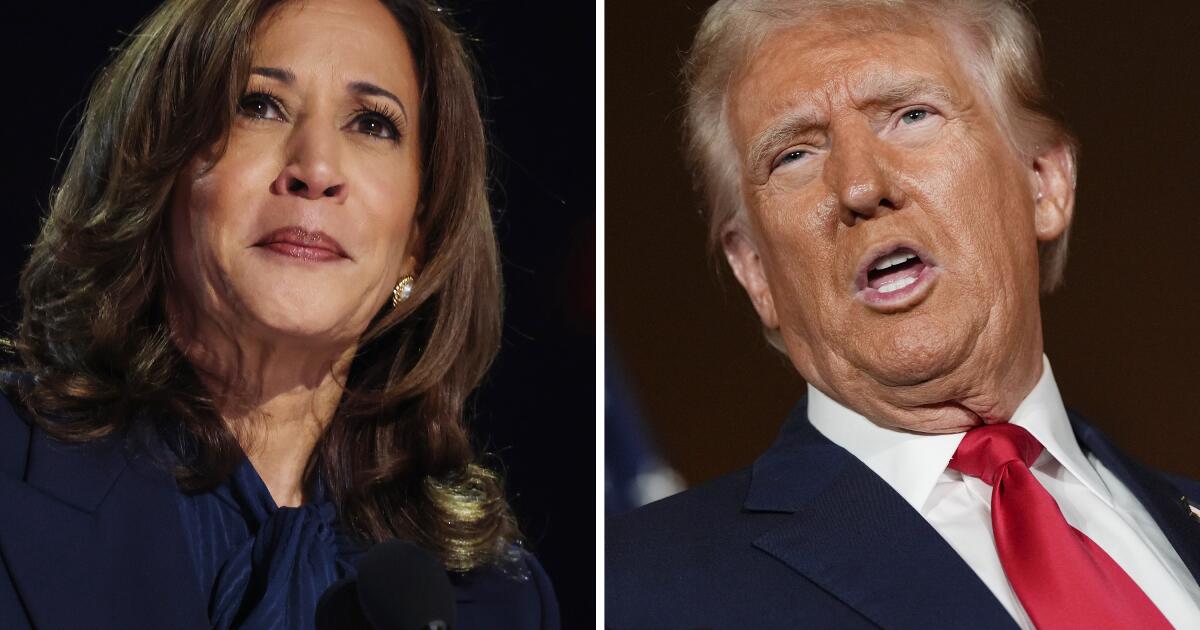
He’s called her Laffin’ Kamala and Lyin’ Kamala. Crazy Kamala and Comrade Kamala.
He’s described the vice president as lazy, dumb and antisemitic. (Even though her husband is Jewish, so maybe Donald Trump should throw in masochistic as well?)
Ever since Kamala Harris became his opponent, an obviously flummoxed Trump has grappled with how to run against a Democrat who doesn’t share his gender, flesh tone or senior status.
Test marketing, he’s fastened onto one line of attack that is particularly noteworthy. Not because it hasn’t sprung from a sandbox, but because it’s such a facile and specious argument: Why, Trump demands, hasn’t Harris already accomplished all that she is promising on the campaign trail?
“She says she’s going to lower the cost of food and housing, starting on Day 1,” he said at a recent swing-state rally in Pennsylvania. “But Day 1 for Kamala was 3½ years ago. So why didn’t she do it then?”
Here’s why: Because she’s serving as vice president of these United States.
Go ahead, criticize the Biden administration and assail its record. Call it, if you’d like, the worst and most incompetent in the whole history of humankind.
But don’t pretend that Harris is the one in charge.
As vice president, “you’re in the room, but you’re not the decision-maker,” said Joel Goldstein, an emeritus law professor at St. Louis University who has written two books on the vice presidency. “You have a voice, but ultimately there’s one vote that counts, and you don’t have it.”
If the question is, “Why didn’t she do it?” Goldstein went on, “the answer is, ‘It wasn’t her administration.’”
The vice presidency has often served as the punch line in a long-running joke — that is, when the office and its occupant have gotten any attention at all. In the corpus of our political system, a vice president is like an appendix; it does some good, but you could easily live without one.
John Adams — the first to hold the position, under President Washington — once called the vice presidency the “most insignificant office that ever the invention of man contrived or his imagination conceived.”
Walter Mondale, who was President Carter’s understudy, described the vice presidency as “an awkward office.” It falls under two branches of government, the executive and legislative, where the vice president serves as tiebreaker in the Senate. (Last December, Harris set a record by casting the most tiebreaking votes ever.)
“Over most of its history,” Mondale noted, “neither branch wanted to see” the vice president.
But the nature of the job changed dramatically under Mondale, who worked out an arrangement with Carter to function as more than a potted plant. Mondale became the first vice president to have an office in the White House, met regularly with the president and carved out a meaningful advisory role in Carter’s administration, a precedent that has been followed in Washington ever since.
One thing that hasn’t changed, however, is the inherently subordinate nature of the vice presidency.
“You step into a role where, by definition, you’re not supposed to lead,” said Christopher Devine, an associate political science professor at the University of Dayton and the author of books on vice presidential candidates. “You’re supposed to take a step back and serve in the shadow of the president.”
That led to a huge expectation gap for Harris — who made history as America’s first female, Black and Asian American vice president — which, in turn, led to a lot of whatever-happened-to questions as she settled into semi-anonymity and the customary role of deferring to the president and carrying out his vision.
It was only a few weeks ago that Harris began fully emerging in her own right, after President Biden stepped aside and the vice president stepped up to replace him as the Democratic nominee.
Since then, polls suggest most voters have little clue what exactly Harris has been up to these last 3½ years, which, from a political standpoint, is one of those good-and-bad things.
Blueprint, a Democratic polling and research organization, said a recent survey found “the general public does not give Harris credit for many of the Biden administration’s popular policies — but that she also won’t have to carry the president’s baggage on issues like inflation.”
In a Washington Post/ABC/Ipsos poll, nearly 6 in 10 respondents said they believe Harris had “just some” or “very little” influence on the administration’s immigration policies, and more than 6 in 10 said she had limited influence on Biden’s economic policies.
(Both surveys were completed before last week’s Democratic National Convention, which devoted four days to wreathing Harris’ in Biden’s successes while ignoring the administration’s failings.)
There are legitimate questions about the counsel Harris has given the president, which would speak to the judgment she’d exercise in the Oval Office. Harris said, for instance, she was “the last person in the room” before Biden launched the deadly and chaotic withdrawal of U.S. troops from Afghanistan. (Trump, of course, can’t help but exaggerate, asserting the vice president had “the final vote … the final say” in the matter.)
Exactly what kind of counsel Harris has offered Biden — and the extent to which the president has paid heed — is unknowable for now.
“It’s always confidential, always behind closed doors,” Goldstein noted. “The vice president can’t say, ‘The president was about to screw up and I told him don’t do that and the sun came out the next day.’”
If only.
What can be said is that it’s absurd to suggest that Harris wielded the power to stem inflation, secure the border, fix the country’s housing shortage and solve the myriad other problems Trump lays at her feet.
There’s a reason President Truman famously kept on his desk — and not the vice president’s — a sign reading “The Buck Stops Here.”
Surely Trump appreciates that pecking order, even if the alpha-obsessed ex-president doesn’t let on.

